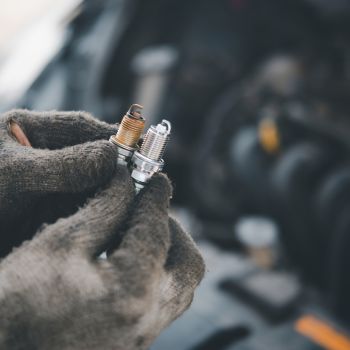 A spark plug may not seem that significant within the design of your car but it’s important to the combustion process. Without the spark plug, the air-fuel mixture cannot ignite and supply your vehicle with the power it needs to move.
A spark plug may not seem that significant within the design of your car but it’s important to the combustion process. Without the spark plug, the air-fuel mixture cannot ignite and supply your vehicle with the power it needs to move.
Especially if your car won’t start, the spark plug may be to blame. Learn what this component does and the signs that your car’s spark plugs are worn or damaged.
What Does a Spark Plug Do?
Spark plugs take the electrical signal from the ignition coil to ignite the air-fuel mixture at specific intervals. In an ideal scenario, this process is precisely timed to burn the exact amount of fuel your vehicle needs to run.
Your car requires specific spark plugs positioned in a series. These support peak vehicle performance and help ensure excess fuel is not burned. The spark created propels the pistons, which then generate the power that helps your vehicle move forward.
If the spark plugs start to experience wear or the electrodes are covered with dirt, carbon deposits or oil:
- Your car may go through fuel at a faster rate
- Your car needs a few tries to get going or may not start at all
- The spark plug may overheat, which accelerates any damage and impacts its performance
Considering these factors, checking the spark plugs is part of routine vehicle maintenance. Based on make and model, this component should be replaced every 30,000 to 50,000 miles.
Indicators of a Bad Spark Plug
An old, dirty or damaged spark plug affects your engine’s overall performance. Common signs include:
- A drop in gas mileage. Your car suddenly gets fewer miles per gallon; in some cases, a 30 percent drop in efficient fuel use.
- Acceleration difficulties. You step on the gas, but nothing happens or your car accelerates very slowly. In the process, the engine may not respond at all or there’s a significant delay. In other cases, your car starts to accelerate but then slows down.
- Startup and ignition issues. While a dead battery or malfunctioning alternator could be to blame, the spark plug may not be fulfilling its role in the combustion process. You may find the engine doesn’t start at all or takes a while to turn over.
- Engine misfiring. You’ll hear your engine hesitate or start and stop, due to a timing interruption in the combustion process. While fuel and valve issues could be the issue, a worn-down and dirty or poorly wired spark plug might not be firing at the right time, which then diverts fuel directly to the exhaust and may damage the catalytic converter. At the same time, not enough fuel and oxygen are being delivered for your engine to operate optimally.
- The engine runs rough. Especially when your car is idling, you may notice a rough or growling sound coming from the engine and feel your car vibrating. This is a result of the cylinders shaking or rattling around due to misfiring in the combustion process. If this continues, the engine may start to knock, which can damage piston heads, cylinders and valves and increase risks for engine failure.
- Black exhaust smoke. Due to more fuel entering the exhaust system, you may see dark, thick, non-transparent smoking emitted from the back of your car. At this point, the catalytic converter could also be damaged and is not controlling emissions as effectively.
- The check engine light comes on. By this point, your car’s sensors notice the spark plug has developed carbon and oil deposits on its surface, routinely overheats or is past effective use. The check engine light can indicate when it’s time for a service appointment.
Keep up with regularly scheduled maintenance at DaSilva’s Auto Body to maintain the integrity and operation of your car’s spark plugs. If you’re concerned about vehicle performance, contact us today to book an appointment.




